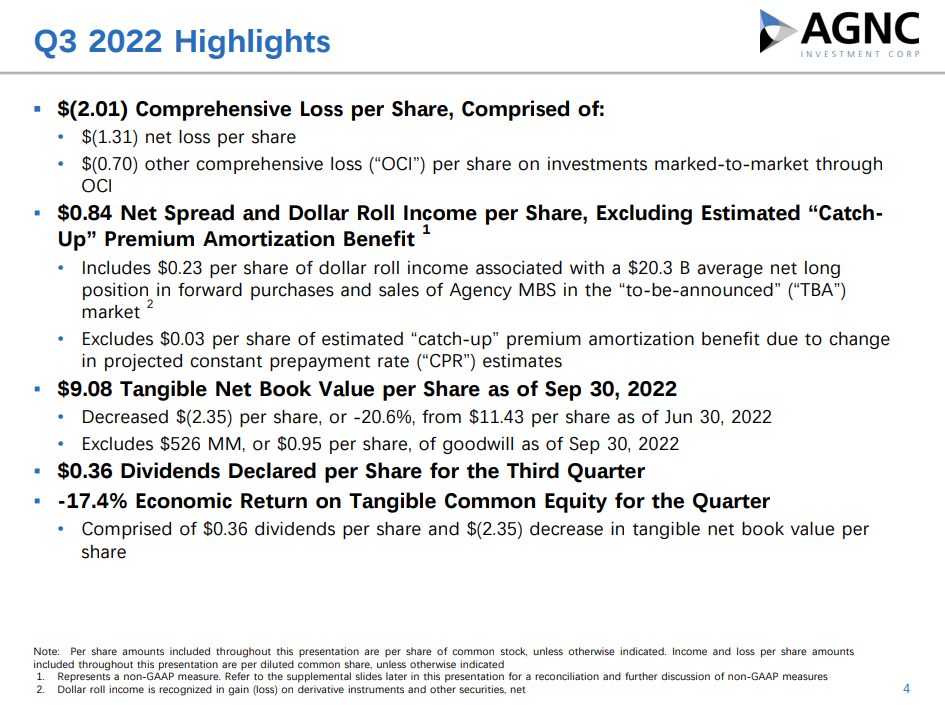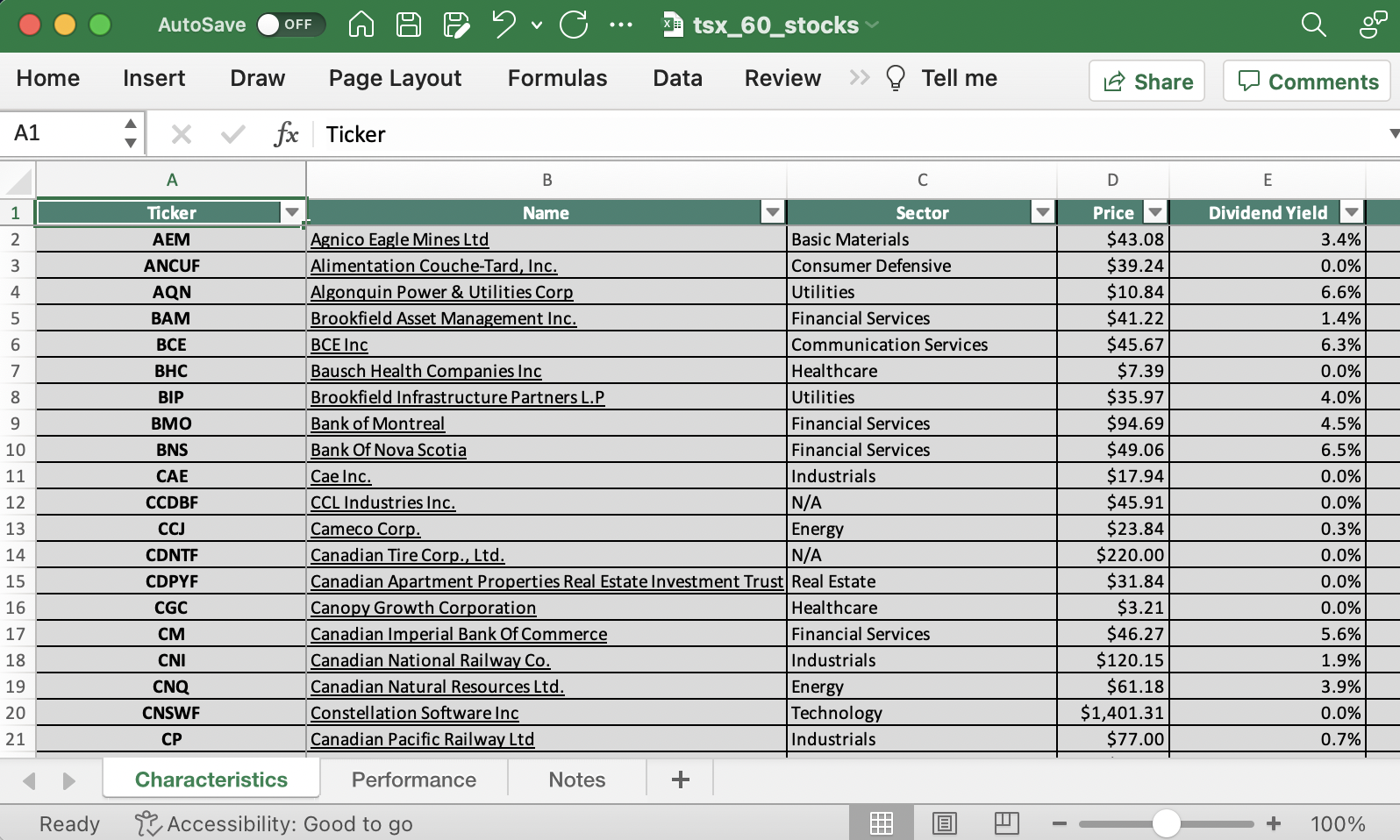Updated on December 9th, 2022 by Josh Arnold
AGNC Investment Corp (AGNC) has an extremely high dividend yield of 14.9%, which is something this stock is certainly known for. In terms of current dividend yield, AGNC is near the very top of our list of high-yield dividend stocks, particularly given its size.
In addition, AGNC pays its dividend each month, rather than on a quarterly or semi-annual basis, as is the case with most dividend stocks.
Monthly dividends give investors the ability to compound dividends even faster. There are not many monthly dividend stocks, as the administrative burden on the companies paying the dividends is higher than paying quarterly, for example.
Indeed, there are only 49 stocks that currently pay monthly dividends. You can download our full Excel spreadsheet of all monthly dividend stocks (along with metrics that matter like dividend yields and payout ratios) by clicking on the link below:
That said, it is also important for investors to assess the sustainability of such a high dividend yield, as yields in excess of 10% are often a sign of fundamental challenges facing the business. Double-digit dividend yields often signal that investors do not believe the dividend is sustainable, and are pricing the stock in anticipation of a cut to the dividend. This article will discuss AGNC’s business model, and whether the stock is appealing to income investors.
Business Overview
AGNC was founded in 2008 and is an internally-managed REIT. Whereas most REITs own physical properties that are leased to tenants, AGNC has a different business model. It operates in a niche of the REIT market: mortgage securities.
AGNC invests in agency mortgage-backed securities. It generates income by collecting interest on its invested assets, minus borrowing costs. It also records gains or losses from its investments and hedging practices. Agency securities are those that have principal and interest payments guaranteed by either a government-sponsored entity, or the government itself. They theoretically carry less risk than private mortgages.
The trust employs significant amounts of leverage to invest in these securities in order to boost its ability to generate interest income. AGNC borrows primarily on a collateralized basis through securities structured as repurchase agreements.
The trust’s stated goal is to build value via a combination of monthly dividends and net asset value accretion. AGNC has done well with its dividends over time, but net asset value creation has sometimes proven elusive.
Indeed, the trust has paid more than $44 of total dividends per share since its IPO; the share price today is just under $10. That sort of track record is extraordinary and is why some investors are drawn to the stock. In other words, the trust has distributed cash per-share to shareholders of more than four times the current value of the stock.
AGNC reported its Q3 2022 results on October 25th, 2022. Tangible book value per share was down from $11.43 in the June quarter to $9.08 at the end of September. Economic return of tangible common equity was -17.4%, versus -10.1% in the second quarter.
Net spread and dollar roll income per share was 84 cents, which was up from 83 cents in the previous quarter, and beat estimates of 69 cents. Annualized net interest spread was 2.81%, up from 2.70% in Q2. Cash and unencumbered agency MBS was $3.6 billion at the end of Q3, up from $2.8 billion in Q2. The trust’s weighted average yield on its portfolio was 9.2%, down from 12.4% in the second quarter.
A more detailed breakdown of AGNC’s third quarter can be seen in the image below:

Source: Investor Presentation
Following Q3 results, the stock is trading at a roughly 7% premium to tangible net book value per share.
Growth Prospects
The major drawback to mortgage REITs is that the business model is negatively impacted by rising interest rates. AGNC makes money by borrowing at short-term rates, lending at long-term rates, and pocketing the difference. To amplify returns, mortgage REITs are also highly leveraged. It is common for mortgage REITs to have leverage rates of 5X or more because spreads on these securities tend to be quite tight.
In a rising interest-rate environment, mortgage REITs typically see the value of their investments reduced. And, higher rates usually cause their interest margins to contract as the payment received is fixed in most cases, but borrowing costs are variable. This double-impact is what investors experienced most recently in 2018 when spreads contracted and book value fell.
However, as interest rates once again fell starting in 2019, AGNC saw the benefit as its spreads stabilized as well, allowing it to produce economic earnings.
Interest rates are once again back on the rise, as central banks around the world have aggressively hiked rates in an attempt to reduce inflation. The trust’s book value contracted in recent quarters as a result of these moves in interest rates, with the sharp decline in Q3 the direct result of this environment.
Overall, the high payout ratio and the volatile nature of the business model will harm earnings-per-share growth. We also believe that dividend growth will be anemic for the foreseeable future.
Dividend Analysis
AGNC has declared monthly dividends of $0.12 per share since April 2020. This means AGNC has an annualized payout of $1.44 per share, which equals an extremely high current yield of 14.9% based on the current share price, which has been very weak in recent months as rates have risen.

Source: Investor Presentation
High yields can be a sign of elevated risk. And, AGNC’s dividend does carry significant risk. AGNC has reduced its dividend several times over the past decade, including dividend cuts in 2020 and in 2021.
We do not see a dividend cut as an imminent risk at this point given that the payout was fairly recently cut to account for unfavorable interest rate movements and that AGNC’s net asset value appears to have stabilized. Management has taken the necessary steps to protect its interest income, so we don’t see another dividend cut in the near term. In fact, we see the payout ratio remaining below 75% of earnings for the foreseeable future. If that’s the case, there would be no reason to cut the payout as AGNC can currently quite easily afford its dividend.
However, with any mortgage REIT, there is always a significant risk to the payout, and that is something investors should keep in mind, particularly given the volatile behavior of interest rates in recent years.
Final Thoughts
High-yield monthly dividend paying stocks are extremely attractive for income investors, at least on the surface. This is particularly true in an environment of low interest rates, as alternative sources of income generally have much lower yields. AGNC pays a hefty yield of 14.9% right now, which is very high by any standard.
We believe the REIT’s high yield to be safe for the near future, but this is hardly a low-risk situation given the company’s business model and interest-rate sensitivity. While AGNC should continue to pay a dividend yield many times higher than the S&P 500 Index average, it is not an attractive option for risk-averse income investors.
If you are interested in finding more high-quality dividend growth stocks suitable for long-term investment, the following Sure Dividend databases will be useful:
The major domestic stock market indices are another solid resource for finding investment ideas. Sure Dividend compiles the following stock market databases and updates them monthly:
Thanks for reading this article. Please send any feedback, corrections, or questions to [email protected].















